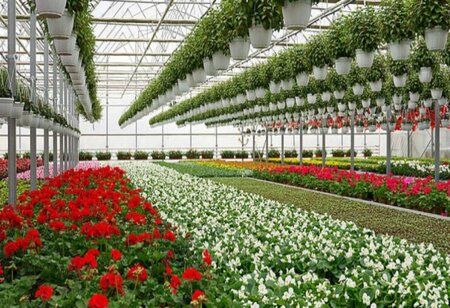
Floriculture: Signalling a Blooming Tomorrow for the Indian Economy


Floriculture plays a vital role in the floral economy, catering to various markets such as retail, events, landscaping, and indoor decoration. Floriculturists employ a range of techniques for nurturing and tending to these plants, including controlled environments within greenhouses and nurseries. They carefully select and breed different types of flowers to offer a wide array of colors, shapes, and sizes that meet consumer preferences and trends. The changing preferences of consumers, along with the rise in disposable income among the general population, are driving growth in the Indian floriculture market. While traditional flowers like marigolds and jasmine remain popular, there is a growing interest in exotic varieties such as orchids, lilies, and a range of colored and hybrid roses. This shift in consumer tastes has encouraged farmers and florists to expand their offerings, leading to a more diverse selection of flowers being cultivated and available in the marketplace. Let’s know more about Indian floriculture market size, Karnataka’s contribution the floral economy and brands leading the market.
Indian Floriculture Industry Size
The size of the Indian floriculture industry was valued at Rs. 292.0 Billion in 2024. Looking ahead, it is expected to grow to Rs 714.6 Billion by 2032. Key factors driving this market expansion include ongoing technological advancements, supportive government initiatives and policies, and the rise of organized retail and e-commerce platforms across the nation.
Despite a rich history in agriculture and floriculture, India's share in the global market for these flowers is minimal. Over the past decade, taking advantage of government incentives, numerous horticultural enterprises have been established in India for the cultivation and export of flowers to developed nations. Many of these enterprises are situated near Mumbai, Bangalore, and Delhi, and they have acquired technical expertise from Dutch and Israeli consultants.
Karnataka’s Floriculture Market
Karnataka leads in floriculture, contributing to 75 percent of the country's total flower production. The state has the largest area designated for modern cut flower cultivation and boasts 40 flower growing and exporting units. Additionally, Karnataka is home to the country's first and only flower auction center.
In Karnataka, 18,000 hectares are dedicated to floriculture. The state has engaged in floriculture for over 300 years, with the Tigala community near Devanahalli and Chickaballapur excelling in flower cultivation.
Brands Leading Karnataka’s Floriculture Market
Karuturi Global Limited
Karuturi Global Limited holds the title of the largest producer and exporter of cut roses worldwide, operating in Ethiopia, Kenya, and India. Founded in 1994, its greenhouse farms cover an area of 250 hectares and yield approximately 500 million rose stems each year. After establishing a formidable presence in the floriculture sector, the company is now working towards expanding its offerings to become an integrated agri-products enterprise with a global reach. The company has acquired substantial land in Ethiopia for the purpose of cultivating and exporting agricultural goods, including cereals, cash crops, and fresh vegetables.
Syngenta Flowers
Syngenta Flowers is a prominent global player in the market for pot and bedding plants. They produce seeds, cuttings, and young plants that meet the needs of both growers and retailers. With a dedicated team of 2,300 individuals, they add vibrancy to the world through innovative varieties across a wide range of crops. As part of Syngenta, a worldwide company that places a strong emphasis on the seeds sector and breeding, the company utilizes advanced breeding technologies. They deliver value to their customers by engaging in creative collaborations with robust partners.
Florance Flora
Florance Flora stands as the top provider of young plants for the commercial production of cut flowers and pot flowers in India. With a commitment to high-quality young plants and a steadfast dedication to customer satisfaction, they serve growers throughout the nation. In the late 1990s, Florance Flora established its Planting Material (PM) division with the goal of being a trustworthy supplier of premium planting material to cultivators.
Over the past twenty years, it has carefully developed alliances with prominent companies in the floriculture sector to bring the latest crops, varieties, and technologies to the Indian market. Currently, it features a diverse crop portfolio and has the capability to source young plants from the finest suppliers. The primary aim of Florance Flora has been to serve the growers and promote their welfare. Bearing this in mind, all actions and initiatives are designed with this single principle as a priority. Rigorous quality control procedures are enforced at the production facilities to ensure that growers receive top-notch material, leading to minimal to no mortality in the field. Furthermore, annual investments are made to consistently enhance the quality of the products.
Lohith Flora
Lohith Reddy, a 31-year-old resident of Kommasandra in Bengaluru, Karnataka, left a promising career in technology to pursue flower cultivation, a choice that has flourished into a business generating Rs 7 lakh per month.
Having come from a lineage of traditional farmers, he was familiar with the dedication and effort required in agriculture. His family possessed four acres of land in Kommasandra, where they cultivated crops such as ragi and lentils.
After earning his engineering degree in electronics from Vemana Institute of Technology, VTU, Lohith was expected to secure a stable position in the tech sector like many of his classmates. However, he had different aspirations.
Also Read: Brands Empowering and Prioritizing the Ethical Handloom and Artisans
Lohith's fascination with flowers began during his schooling years, largely thanks to his cousin, Gopal S Reddy, who had been in the flower business since 1995 and ignited his interest. When his cousin transitioned to protected cultivation farming, Lohith took an active role in the everyday operations.
Through commitment and perseverance, Lohith has established a strong foundation for his farm. He also recognized the significance of quality early on. He observed that many farmers were not producing high-quality chrysanthemums, which impacted their durability.